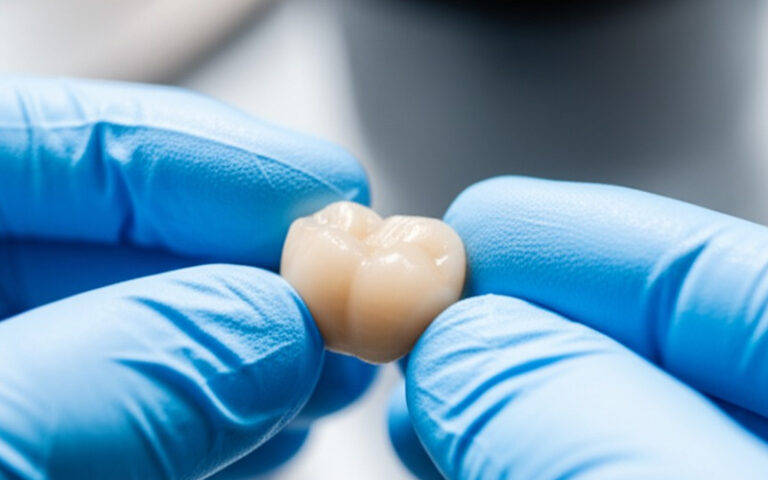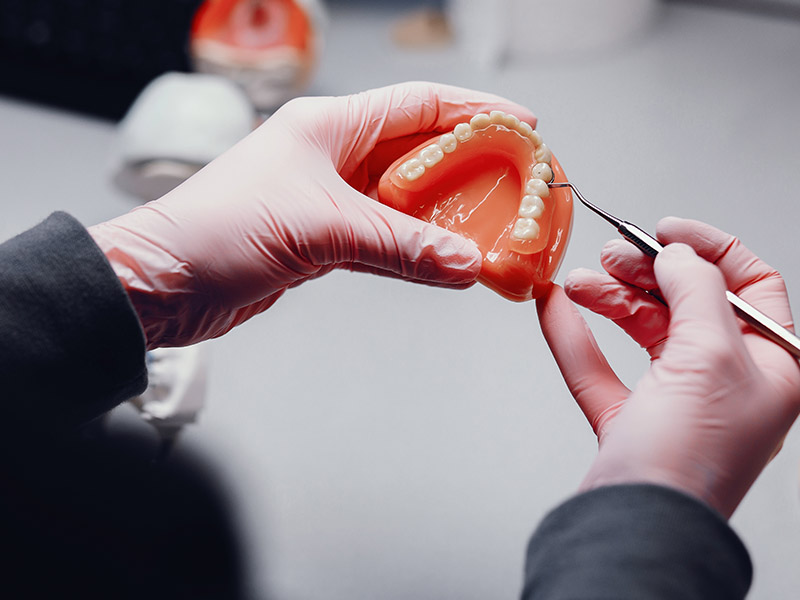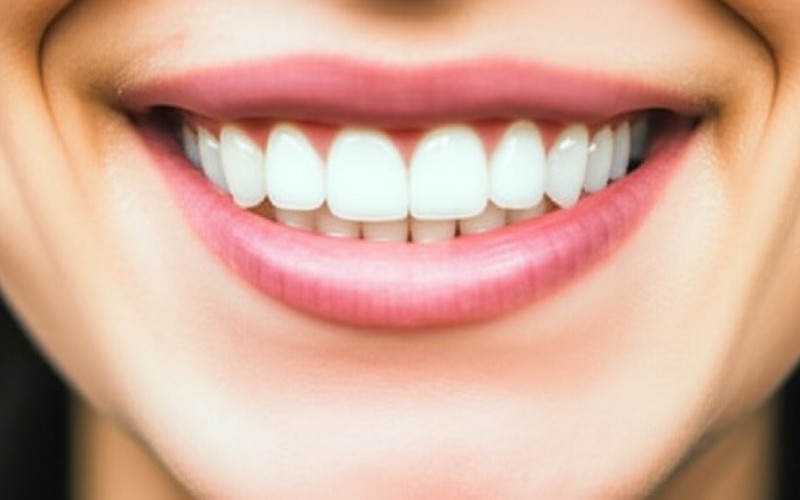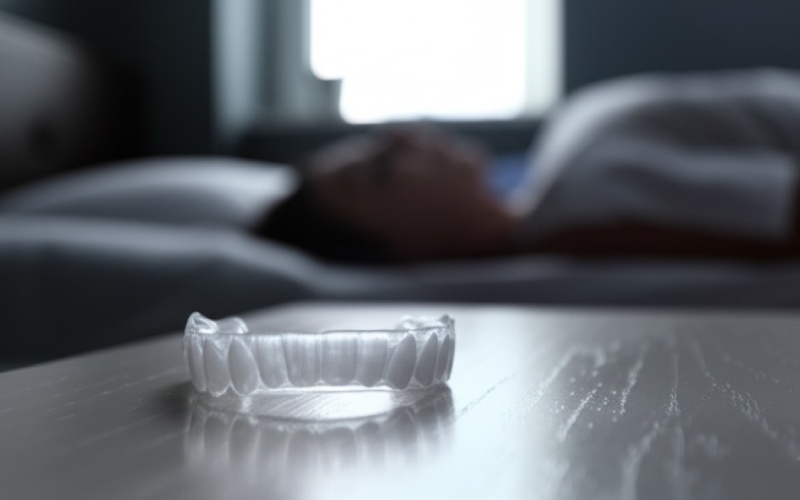
Hård vs. Blød Natbeskyttelse: Stop med at Skære Tænder én Gang for Alle
In this article, you will learn the real difference between a Blød nattevagt og en Hård nattevagt. This will help you and your dentist decide which is best to stop the damage from teeth grinding.
Indholdsfortegnelse
What is Bruxism and Why Should You Care?
Bruxism is the medical term for when you grind or clench your teeth. Many people do it while they sleep and don’t even know it. This constant grinding and clenching puts a lot of pressure on your teeth, your jaw, and your muscles. It’s not just a bad habit; it’s a real dental problem. Over time, this can cause serious tooth damage. Your beautiful tooth can become chipped, cracked, or worn down to a stump. You might need a crown or a filling to fix a damaged tooth.
The reason you should care about bruxism is simple: it harms your health. The constant pressure can lead to a sore jaw and chronic headaches. The strain on the jaw can also lead to something called a TMJ disorder, which affects your jaw joint. If you grind your teeth, you are slowly destroying them. A night guard is a simple appliance that creates a barrier between your upper and lower teeth. It’s the best way to protect your teeth from the damage you do when you grind them at night. Without it, you risk expensive dental work down the road.
So, What Exactly is a Soft Night Guard?
A soft, rubbery mouthguard is pretty much what a soft night guard is. Soft night guards are made of a pliable, flexible material, often a type of silicone or soft plastic. They feel flexible in your hands and are generally more comfortable to wear at first. Because they are soft, they are often recommended for people with mild bruxism or for those who only clench their teeth instead of grinding them hard.
The main job of a soft night guard is to provide a cushion. When you clench down, the soft material absorbs some of the bite force. This can alleviate some of the strain on your jaw muscles. These soft guards are ideal for people who are just light grinders. The problem is, for a serious grinder, a soft night guard can sometimes make the problem worse. The soft, chewy texture can actually encourage your jaw to grind and clench more. Think of it like a piece of gum you can’t stop chewing. A soft night guard can be a good start, but it has its limits.
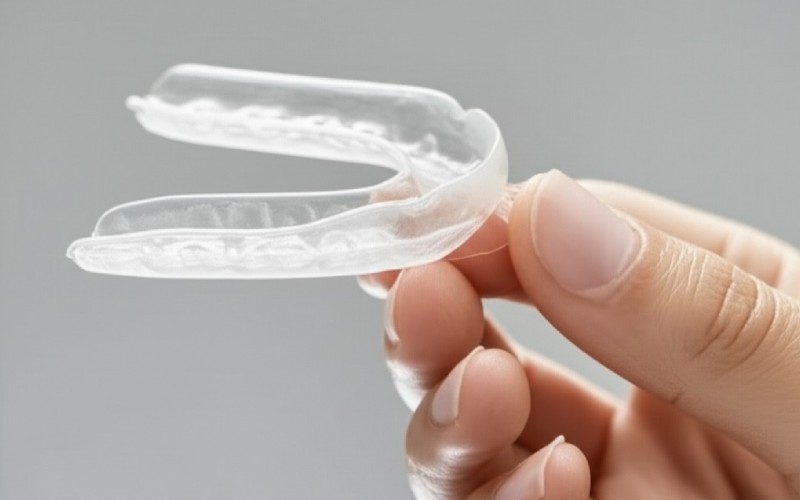
And What About the Hard Night Guard?
A hard night guard is very different. As the name says, it is hard. Hard night guards are made from a rigid, durable plastic. It’s often a type of hard acrylic, sometimes called modified ethyl methacrylate. This material is not flexible at all. When you get a custom-fit hard guard, it snaps perfectly onto your tooth line. It feels more like a retainer than a mouthguard.
The purpose of a hard night guard is not to be a cushion. Instead, it creates a hard, slick surface between your teeth. When your top teeth try to grind against your bottom teeth, they just slide across the hard surface of the appliance. This is key. It prevents you from being able to lock in and grind your tooth enamel away. A hard night guard is designed to withstand heavy grinding and clenching. Because the guard is made of such a firm material, it’s the best choice for people with severe grinding problems.
Hard or Soft: Which Night Guard Offers Better Protection?
This is the big question. When it comes to protecting the teeth, a hard night guard almost always wins, especially for moderate to severe grinders. A soft night guard offers a cushion, which is good, but it doesn’t stop the grinding motion. For some, the soft material can act like a toy, making you want to clench and chew on it in your sleep. This can actually strengthen your jaw muscles and make you grind even more. This is why a soft night guard is usually only for people with mild bruxism.
A hard night guard, on the other hand, offers true protection. It takes away the ability to grind tooth against tooth. The hard surface forces your jaw into a more relaxed bite position, which can lead to reducing jaw muscle activity over time. This not only protects your tooth surfaces but can also help alleviate TMJ disorder symptoms by letting the jaw joint rest. So, while a soft night guard is better than nothing, a hard night guard provides superior protection and can even help train your muscles to clench less over time. If you seriously grind your teeth, a hard guard is the best defense.
Are Custom-Fit Night Guards Really Worth the Cost?
You might see over-the-counter night guards at the drugstore and wonder if a custom-fit one is necessary. The answer is a strong yes. A custom-fit night guard made by a Dentallaboratorium is far better. Your dentist takes an exact impression of your teeth. This mold is sent to a dental lab where they fabricate a guard that snaps perfectly onto your teeth. This perfect fit is so important for a few reasons.
First, comfort. A custom night guard is made for your mouth and your mouth only. It won’t feel bulky or slip around at night. Getting used to wearing a night guard takes time, but a perfect fit makes the adjustment period much easier. Second, a poor fit can cause problems. A store-bought guard can shift your bite or even loosen a tooth or crown. A custom-fit appliance, whether it’s a soft night guard or a hard night guard, will protect your teeth without causing other dental issues. The cost is higher, but you are paying for safety, comfort, and the best possible protection for your dental work and your natural tooth structure.
Let’s Talk Durability: Hard or Soft Night Guards, Which Lasts Longer?
Durability is a huge factor when choosing a type of night guard. A night guard is an investment in your dental health, and you want it to last. In this category, the hard night guard is the clear winner. Because they are made of hard acrylic, hard night guards have a much longer lifespan. They are built to withstand severe grinding forces night after night for years. With proper care, a hard guard can last for five to ten years.
A soft night guard, on the other hand, has a much shorter lifespan. The pliable, soft material just can’t hold up to intense grinding and clenching. A heavy grinder can chew through a soft night guard in a year or even less. The material is also more porous, which means it can stain and hold bacteria more easily if you don’t do a regular cleaning. The reduced durability of a soft night guard means you will have to replace it more often. While a hard night guard costs more at first, its durability can make it a better value in the long run.
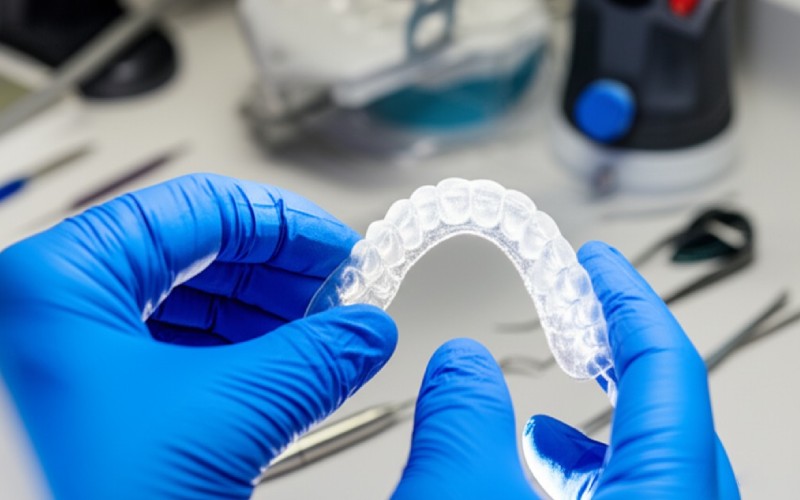
What Are Hard and Soft Night Guards (The Hybrid Option)?
What if you want the comfort of a soft night guard but the durability of a hard night guard? There is a solution for that. It’s a hybrid model, often called a dual laminate or hard and soft night guards. This type of night guard is the best of both worlds. Night guards are made with two layers. The inside layer that touches your teeth and gum line is soft and pliable for comfort. The outside, or occlusal surface, is made of a hard, durable material.
This design gives you a comfortable, perfect fit with a soft inner layer, but a tough outer layer that can withstand grinding. The hard surface prevents you from being able to grind your teeth, while the soft inside makes it much easier to wear all night. These dual laminate guards are great for people with moderate bruxism who find a full hard guard uncomfortable. They are also a good option if you have sensitive teeth or existing dental work like a veneer. This type of guard is often a great compromise.
How Do I Know if I Need a Hard or Soft Night Guard?
Deciding between a hard or soft night guard depends on your specific needs. The first step is to talk to your dentist. Your dentist can look at your tooth wear and help you figure out how severely you grind or clench. As a general rule, a soft night guard is best for people with mild to moderate teeth clenching. If you don’t grind much but just clench your jaw tight, the cushion of a soft night guard might be enough to alleviate the pressure.
You likely need a hard night guard if you have severe grinding and clenching. If you wake up with a sore jaw, headaches, or if your dentist sees major wear on your tooth enamel, a hard guard is the way to go. Its durability and design are made for a heavy grinder. It is the only appliance that can truly stop the grinding motion. The choice between soft or hard also depends on comfort and whether you have TMJ disorder. Your dentist is your best partner in making the right choice to prevent tooth damage.
What is the Process of Getting a Custom-Fit Night Guard?
Getting a custom-made night guard is a simple process. It starts with a visit to your dentist. If you and your dentist decide a night guard is right for you, they will take an impression, or mold, of your teeth. This is a quick and painless process where you bite down on a tray of soft material for a minute or two. This impression creates an exact copy of your teeth, ensuring a perfect fit for your new dental guard.
That impression is then sent to a professional dental lab. At the dental lab, trained technicians use your mold to create your custom night guard. They use high-quality materials, whether it’s the flexible material for a soft night guard or the hard acrylic for a hard night guard. They carefully fabricate the appliance to fit every curve of your tooth line. In a week or two, your guard is sent back to the dentist. You will have a final appointment to make sure it fits perfectly. Your dentist might make small adjustments to ensure your bite is comfortable. Then, you are ready to protect your teeth.
Final Verdict on Hard vs. Soft Night Guards
The most important thing is that the right type of night guard is a personal choice based on your level of grinding. A soft night guard can work for a light clencher. But for anyone who is a serious grinder, a hard night guard or a hybrid model offers much better protection and durability. Don’t rely on guesswork. Talk to your dentist about your teeth grinding. An expert in dentistry can guide you to the perfect appliance to protect your smile for years to come. Investing in the right custom night guard is one of the best things you can do for your long-term dental health.
Things to Remember:
- Bruxism is serious. It is the medical term for teeth grinding and clenching, and it can cause severe tooth damage, jaw pain, and headaches.
- Bløde nattevagter are made of a flexible, pliable material. They are best for people who clench their teeth or have only mild bruxism. They have a shorter lifespan.
- Hårde nattevagter are made of a rigid, durable acrylic. They are best for moderate to severe grinders because they create a slick surface that prevents grinding. They have excellent durability.
- Hybrid guards (hard and soft night guards) offer a soft, comfortable inside and a hard, durable outside. They are a great option for many people.
- Always choose custom-fit. A custom night guard from your dentist and a dental lab offers a perfect fit, which is safer and more effective than a store-bought guard.
- Consult your dentist. Your dentist is the best person to help you decide which type of night guard is right for you based on your specific level of grinding and clenching.


